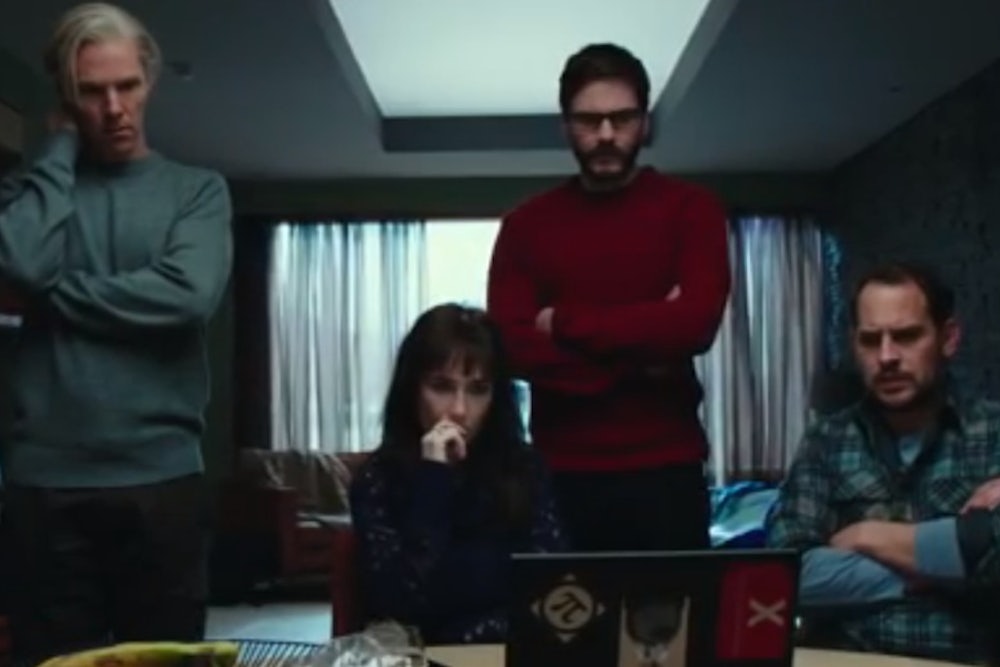This piece originally appeared on newstatesman.com.
Let’s get the personal bit out of the way. How did Peter Capaldi do?
Any editor about to be in a Hollywood movie really wants something along the lines of Jason Robards. Ben Bradlee of the Washington Post may have made the tough calls over Watergate, but most of us think of him as Robards portrayed him in All the President’s Men – feet on desk, tie at half mast, barking gravelly instructions through a halfsmoked fag at Woodward and Bernstein. Or Redford and Hoffman, as we indelibly remember them.
No Robards for me, but Capaldi, who can do anything from demented, foul-mouthed Scottish spin doctors to all-knowing, allseeing time lords. An early version of the script did open with the Guardian editor drawling the following line: “Goddam impatient American assholes.” Which owed little to my Kentish Town roots, but did have a satisfyingly Robards, Martini-soaked growl about it. But the line got cut.
Instead, The Fifth Estate begins with Capaldi’s Rusbridger swearing at the former executive editor of the New York Times, Bill Keller. “Thanks very much for not giving a shit.” This did make me sit up and take notice. Although I never said any such thing, it suggested that Malcolm Tucker was about to be let loose on the Guardian newsroom.
But it doesn’t happen. Capaldi is rather understated and sotto voce. He could come and edit the Guardian any time. Dan Stevens is a very dashing deputy editor Ian Katz, though a touch colourless. My poor old colleague David Leigh – who had much to do with getting the WikiLeaks stories into publishable shape – is written out of the script altogether. And the heroic reporter Nick Davies emerges, via David Thewlis, as a bit more moth-eaten and cynical than he is in real life. Though the beaten-up leather jacket is spot on.
But the clue is in the title. This film is not really about a newspaper: it’s about the fifth estate – the rather more amorphous form of media that has not replaced newspapers (and I think won’t), but is nonetheless revolutionary, disruptive and disturbing. In good and bad ways. So, although the film begins and ends in the Guardian’s offices, the heart of it is really a buddy movie about Julian Assange and his collaborator on WikiLeaks Daniel Domscheit-Berg.
The film traces the evolution of WikiLeaks from its reasonably anonymous start, causing headaches to assorted banks, business and governments, to the moment it burst on to the global stage with the Iraq war logs and cables leaked by Chelsea Manning, published in partnership with the Guardian, the New York Times and Der Spiegel.
The two geeks bond. Berg initially has a kind of sweet puppy love for the whitehaired wizard of hacking. But, in time, the curtain is drawn back on Assange’s wizardry. The army of volunteers he keeps boasting about doesn’t actually exist. When it comes to minimising harm from the documents about to be released there is no one to do it. The geeks fall out.
If you’re not a geek, some of this may be a little dry and even hard to follow, but the film has two things at the heart of it which make it work – or did for me. One is the performance of Benedict Cumberbatch, who is stunning as Assange. The voice and the slightly jerky, stiff, awkward demeanour are just right. More importantly, he captures the kaleidoscopic nature of Assange’s make-up, as most people experience it: brilliant, difficult, rhetorical, paranoid, inspiring, odd, cold, warm, solipsistic, manipulative, strategic, scheming, devious, visionary, dismissive, impulsive, deliberate . . .
The film’s other strength is that it does seek to do justice to the revolution implied in its title. Josh Singer’s script cleverly (if at times earnestly) grapples with the nature of the disruption at the heart of WikiLeaks: the mayhem being caused to media, business, intelligence, government, banking, diplomacy and plain old tyranny.
There’s a well-acted, if speculative, subplot within the US state department involving Laura Linney and Stanley Tucci. There’s a made-up bit about extracting a possibly compromised source in Libya. The Capaldi/ Rusbridger character has to suffer a lecture from Thewlis/Davies about “churnalism” as C/R opts for Diana over the US primaries. Most of this is make-believe.
But the bigger picture is true and important. Manning and Assange – and Berg – started something hugely significant. The part played by the not-much-celebrated-thesedays fourth estate was also vital. WikiLeaks did something historic, frustrated in part, as the film suggests, by the characters of those involved. Yet the idea won’t go away. Ryan Gosling as Edward Snowden?
This piece originally appeared on newstatesman.com.
